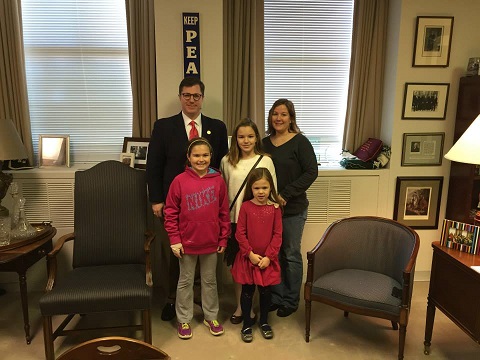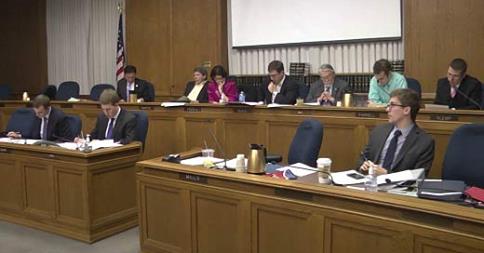~ Proposals will let teachers spend more time on classroom instruction and less time on mandatory reporting, give teachers additional support, and continue to reform student assessments ~
RICHMOND, VA - House Republican leaders announced their education agenda for the 2015 General Assembly on a press conference call with reporters Thursday. The “Classroom Success” agenda seeks to give every Virginia student access to a quality education. It builds on successful efforts in recent years to recruit and reward excellent teachers and give students additional pathways to success.
Speaking about the proposals, House Education Committee Chairman Steve Landes (R-Augusta) said, “No other policy area matters more for the future success of our Commonwealth than education. That’s why House Republicans put ‘Classroom Success’ education reforms at the center of our legislative agenda for 2015. This year, we have put forward important measures to support our hard-working teachers, give teachers and administrators flexibility to provide students with the best possible education, and improve the Standards of Learning tests to better measure actual student success. As Chairman of the House Education Committee, I look forward to working with Republicans and Democrats, as well as education leaders from across Virginia, on these important initiatives.”
“Virginia’s teachers have a lasting impact on the long-term success of our children,” said House Majority Leader Kirk Cox (R-Colonial Heights), a retired teacher with more than 30 years of classroom experience. “That’s why we will build on recent efforts to support our dedicated teachers by prioritizing professional development and providing a platform for teachers to share best practices across the Commonwealth. Our SOL Reform efforts last year brought about many needed changes. Supporting our teachers during this transition period is critical. If we are to attract and retain the best and brightest teachers in Virginia, we must treat them like the professionals that they are.”
“Accountability is vitally important, but we must continue to seek the right balance in the classroom. Too often, teachers, students and parents are frustrated by overly-burdensome testing, which crowds out the valuable time that should be used for learning,” said Tag Greason (R-Loudoun), who will introduce additional reforms to Virginia’s assessment system. Greason carried last year’s landmark SOL reform bill. “Last year, we eliminated five SOL tests in grades 3-8. This year, we propose the expansion of expedited re-take tests for more students, as recommended by the SOL Innovation Committee, and will encourage the development of interdisciplinary tests that promote critical thinking and problem-solving skills.”
Greason will also introduce legislation to reform the school accreditation process. “The current one-size-fits-all accreditation system is ineffective. It unnecessarily burdens school leaders,” said Greason. “Good schools with track records of success should be freed from annual accreditation reporting, allowing teachers and administrators to spend more time on student learning. This proposal will give local leaders needed flexibility without sacrificing accountability in our schools.”
Steve Landes continued, “These are smart policies that will give students across the Commonwealth a better path to classroom success. As a parent, I’m eager to see these meaningful education reforms enacted. They will make a positive difference for students and teachers.”
Alan Seibert, the President of the Virginia Association of School Superintendents applauded the proposals saying, “VASS is pleased with the bipartisan attention that K-12 education is receiving here in the Commonwealth, from reforming how students are tested, to how schools are accredited, and how success, progress and improvement are reported. Virginia's Superintendents have identified these issues, school funding, and instructional delivery in our Blueprint for the Future of Public Education and look forward to collaborating with the House Leaders, the rest of the General Assembly and the Administration in how to best achieve these goals."
House Republican Caucus K-12 Education Agenda
Supporting Our Teachers
Teacher Professional Development – As we continue to reform our assessment system to transition away from multiple choice and rote memorization, we are asking teachers to focus on critical thinking, problem solving, and implementing authentic performance assessments. To help in this transition, the House will prioritize teacher professional development as part of our ongoing effort to support Virginia’s teachers. This will include developing a process to share teaching best practices across the commonwealth.
Reducing Bureaucratic Red Tape
Accreditation Flexibility (Greason) – Reform the standards of accreditation to provide flexibility in how often schools are accredited. Today, every school must endure the lengthy accreditation process every year. Under this proposal, schools with a track record of success would be able to apply for a waiver allowing them to seek an alternative accreditation cycle of three or five years, depending on their past accreditation performance. This legislation is based on a recommendation of the Standards of Learning Innovation Committee.
School Report Cards (Greason) – Replace the current A-F system with a more comprehensive school report card. The school report card would give parents a more complete way to measure the success of local schools without being overly simplistic or unfairly stigmatizing local schools. The improved report card will focus on a wider range of metrics designed to give a better sense for how a school is doing.
Better Measures of Student Success
Expedited Retake (HB 1490; Habeeb) – Streamlines the state’s Standards of Learning retake process for all students at all grade levels. Students who nearly pass a standardized test would be given an additional opportunity to take the test during the same school year, giving them an additional opportunity to succeed. Interdisciplinary Assessments (Greason) – Recommend that the Board of Education and Department of Education consider the inclusion of interdisciplinary assessments as part of continued efforts to reform the Standards of Learning tests. This would allow teachers to use different subjects like science, math, reading and writing in one test. This would encourage critical thinking and problem-solving, rather than simple rote memorization in one subject.
Other Proposals
Student privacy (HB 1307, HB 1334; Landes) – Enact additional safeguards to protect student privacy by prohibiting the collection of student social security numbers and by requiring the Department of Education to develop uniform policies related to the collection, storage and use of student’s personally-identifiable information. Virtual Schools (HB 324, HB 1361; Dickie Bell) – Establishes the Virginia Virtual School and its governing board. The school is open to any Virginia student and will provide an educational program that meets the state’s Standards of Quality for grades K-12. College Credit for AP Courses (HB 1336; Landes) – Requires the State Council of Higher Education to develop a standardizes system for granting college credits to students who have successfully completed one or more Advanced Placement, Cambridge Advanced (A/AS), College-Level Examination Program (CLEP) or International Baccalaureate courses.






